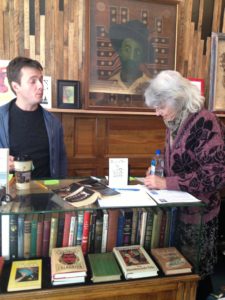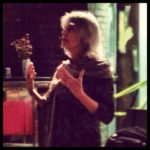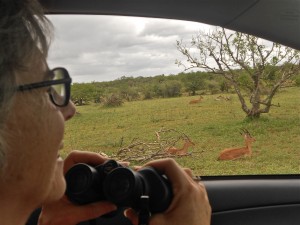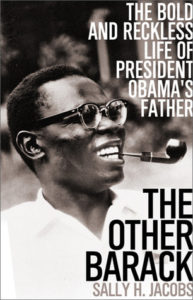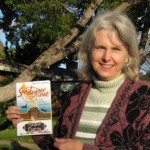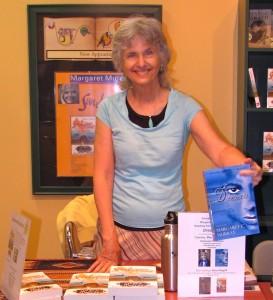
Last week I began my first-ever Writing Workshop. It was cold and dark in the parking lot when I arrived at Infusions Teahouse in downtown Sebastopol, CA with my Mac computer, a few books and materials. Why was I here? I am passionate about writers and the power of words. We writers are translating our hearts to paper (or computer screen) and our work needs to be nurtured. All our work begins in the heart. If you want to be a player as I do, a writing activist as it were, you want to do more than observe; you want to join in. You need a certain kind of community, a community of literacy.
In my writing workshop I want to build community to explore our written self-expression. To write, we need an audience. And to build the audience, we need to become it. That’s why feedback from our peers is so important. We need a safe place to share our work-in-progress and David Gambil, owner of Infusions Teahouse, offered me that safe place.
The teahouse, a small rectangular room, had one side devoted to a long counter containing exquisite chocolates behind glass fronting a wall of teas. The place was busy, humming and full of customers. All sorts of local people were in animated conversation, reading or deep into their laptops. Three men in heavy coats were talking in big armchairs around a low table. The space I was hoping for in front of the window was taken as was every other chair and table.
What a crowd! I sat down at a round stool at the counter and wondered where we could sit. With all the activity and buzz, would we be able to hear each other talk, not to mention read our work?

Soon I found my participants–a poet, a novelist and a writer of interactive adventure ebooks. Minutes later, helpful employees cleared several tables after generous patrons offered their tables as they left.
“Let’s begin by introducing ourselves,” I said when the four of us were facing each other by the window. Why were they here? The responses were moving, exciting and inviting. What were their intentions for this workshop? Really, there was only one, repeated over and over, using phrases such as “committed to the work”, “need to finish” and “get my work out into the world”.
I brought up the different writing genres and mentioned how skill in one genre leads to skill in another. We talked about the origins of my two novels, Sundagger.net and Dreamers as well as the non-fiction travel memoir of living on a boat in the Bay by Shelley Buck, Floating Point. One participant read aloud the magical poem, The Dove by famed songwriter, Leonard Cohen, which I had copied from Everyman Library Pocket Poets.
Quoting the truism that 80% of writing is reading, I showed two novels I had read recently and couldn’t put down. You remind me of me, by Dan Chaon, is a story about the power and pitfalls of family and adoption. I quoted the author from his interview at the end of the book, adding that his experience resonates with me: i.e., Dan Chaon’s belief in the power of story and how he starts out with a title only and “dreams” himself into the story.
The other book I just read was How to Buy a Love of Reading, by Tanya Egan Gibson, a very literary, quirky-punk coming-of-age story of an unhappy teenager from a wealth, dysfunctional family. The chapters are divided into Setting, Plot, Devices, Backstory, Theme, Time and Tense, and Point of View in that order. You can find out more in my review on Goodreads.
Additionally these novels appealed to me because of how and where I found them–not through national bookstore chains or media publicity but at a grassroots level. I had met the author of one at the Northern California Storytellers Festival while my favorite librarian at the Hercules Library recommended the other.
Now we had arrived at the heart of my workshop–the writing itself. One courageous woman brought her poems, explaining their context and what kind of feedback she was looking for. We listened as she read a few aloud to us several times.
We discussed the poems while the writer took notes. No questions were asked of or answered by the writer. It was as if the writer were not present. Why? I explained to the group that this way no writer is put on the spot and does not need to defend her work. More importantly, she has the space to actually hear how her writing is being received. Also, the group can compare, question or respond to each other’s impressions, feeding each other’s responses and building on them, rather than directing every comment back to the writer. New ideas are generated in this spirit of brainstorming and the entire group becomes committed to having the piece (in this case, her poetry) be as successful as possible, as opposed to merely criticizing or pointing out limitations. Of course, at end of discussion, the writer is free to reply or not and free to take whatever she can use from our feedback. Honestly, our poet was thrilled with the feedback of the group. I know this because she emailed me later.
We ended up with a short 7-minute writing assignment on the subject of age (a topic brought up regarding our own ages related to point of view). Each of us chose an object we could see around us in the teahouse to include in the writing about age exercise.
At the end, I let everyone know that any work they wanted to submit could be emailed to me and reposted to the group. In addition, I would provide written comments on their drafts. Next Wednesday we would meet at 6:30 p.m., an hour later.

Leaving, I felt so grateful, so inspired. My first From Heart to Paper Writing Workshop was a success!


